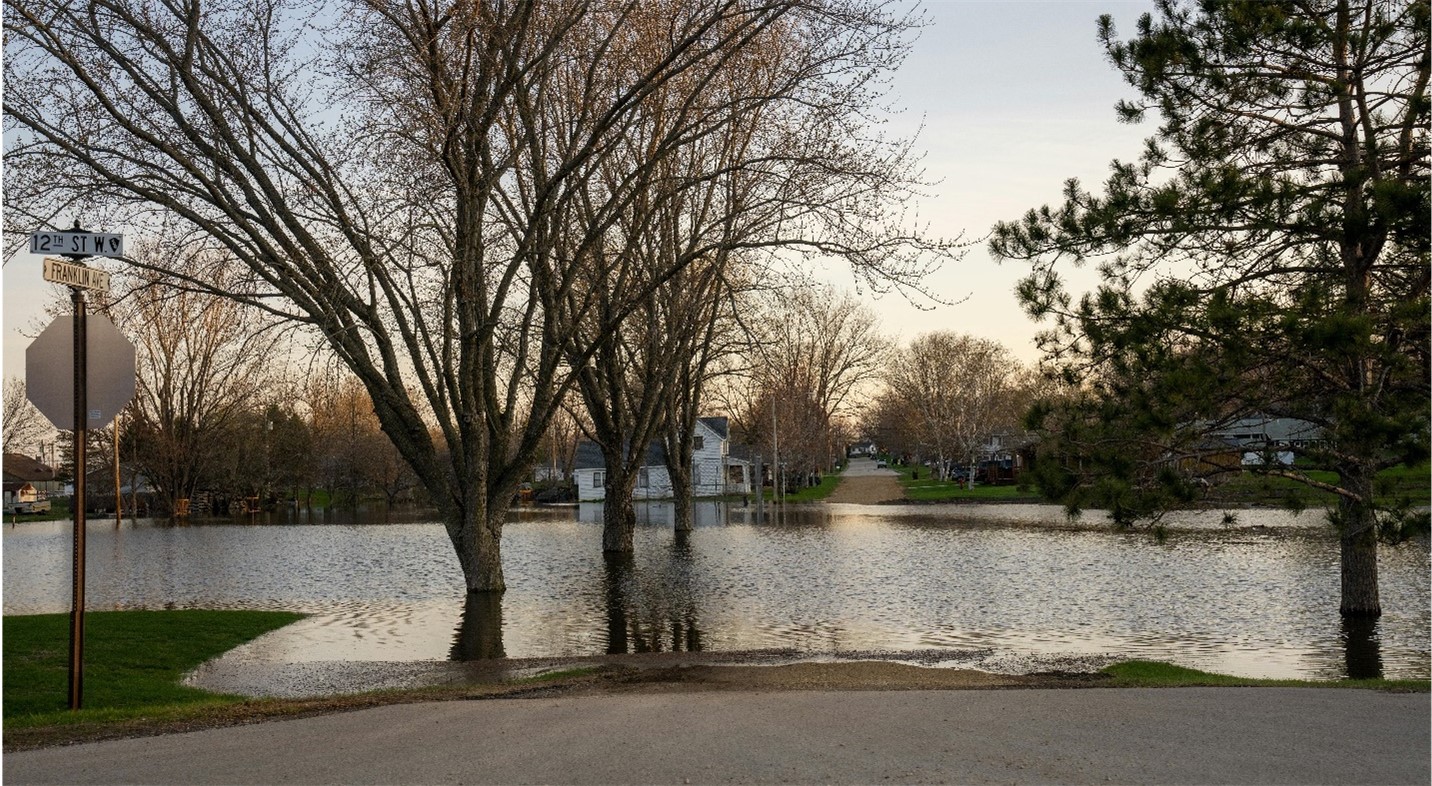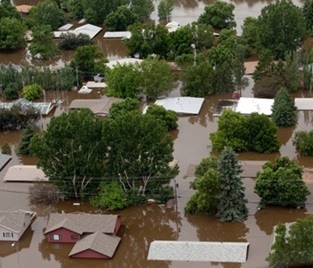
Homeowners in Shiloh, situated in Coffee County in southern Alabama, have questions. According to an exposé by Inside Climate News, officials put deed restrictions on their home titles, preventing them from suing the state.
These covenants run with the land, binding the deed holders — and anyone who might ever receive their deeds, far into the future.
The Southern Environmental Law Center has pressed the Alabama Department of Transportation (ALDOT) to acknowledge these owner’s very real concerns about the agency’s refusal to assist residents when their homes were inundated with stormwater after a major construction project.
Notorious History: Use of Deed Restrictions
Restrictive covenants limit what a deed holder can and can’t do. Sometimes, restrictions make perfect sense. They’re often put in place to ensure reasonable stewardship of land and buildings.
But there’s another side to deed restrictions. Throughout our nation’s history, they’ve also been subject to manipulation.
Indeed, restrictive covenants have a notorious past in Alabama. They’ve been used to racially segregate neighborhoods. A century ago, this was just how things were. Alabama courts upheld deed-related segregation. For instance, covenants in Montgomery, noted by Alabama’s Supreme Court in Scheuer v. Britt (1928), kept certain properties off-limits to Black residents. These deed covenants were deemed legal and enforceable. Otherwise, a deed holder could “convert the district into a negro settlement in violation of the restriction” and reduce the area’s desirability and home prices.
Yes, judges of Alabama saw fit to declare the equivalent of “There goes the neighborhood.”
This unfair practice was barred by the U.S. Supreme Court 1948. Or was it? That year, the Supremes did hold race-based deed restrictions unconstitutional. Even so, federal and state officials, along with real estate professionals and lenders, kept using discriminatory tactics.
And today, people in Shiloh have questions. Is Alabama putting a new twist on a very old, very offensive technique? Shiloh residents have started to think so. They point to the restrictive covenants on home deeds in this historically Black area. This new language on their deeds was written by state actors who seem keen to shirk responsibility for routine flooding connected to the widening of a roadway.
The Trouble in Shiloh—Dating Back to 2017

The rains in Shiloh inundate homes. They spread oils and contaminants onto people’s yards.
It wasn’t always this way. But in 2017, the state’s transportation department contracted with a construction firm to expand U.S. Route 84. After the construction work, yards and homes were suddenly in the line of stormwater runoff coming from a raised section of the route that had turned the town into a bowl.
To make matters worse, Alabama installed a faulty drainage system. It sends stormwater straight into Shiloh’s home properties. So, flooding is now a frequent occurrence in Shiloh. And not only frequent, but severe. It leaves people up to their ankles in stormwater. Sometimes, people have had to be temporarily rehomed after heavy rainfalls.
Some deed holders lack the legal ability to hold the state responsible. This is due to the restrictive covenants the state pressed on them. They are not permitted to file future actions against Alabama related to the road and drainage.
Homeowners Signed Their Legal Rights Away—Without Realizing It
Some desperate Shiloh residents sought out a Birmingham lawyer to help them. They started off by asking for financial fairness from the state and its contractor. They couldn’t handle the problem themselves. Most lack the funds to deal with their toilet backups, or the overflowing septic system that inundates their yards.
Shiloh residents are taxpayers, of course. They have every reason to demand that the state’s transportation agency cover the damage. They want their homes restored.
Ultimately, the lawyer suggested that the residents agree to a settlement with Alabama’s transportation agency and its contractor. The residents say they wound up getting minor payouts. They told Inside Climate News they didn’t understand the significance of a specific part of the agreement — the part that dealt with the restrictive covenant the state would place on their deeds.
Court documents discuss the deed language at issue. The restrictive covenants say the deed holders own the properties “subject to” a “continuing condition and restriction.” The language states that the deed holders “release forever any claim” against the state involving the stormwater runoff that floods their properties.
They didn’t understand the ramifications of settling under these terms, the deed holders say. Nor was anyone explaining the history and impact of restrictive covenants on minority communities. The one homeowner who began the lawsuit said the Birmingham lawyer ought to have made things clearer. She added: “We were lied to.”
Reporters from Inside Climate News tried to get the side of the Alabama Department of Transportation. The reporters’ requests went unanswered.
Advocate Calls the Deed Manipulation “Highway Robbery”
In April, U.S. Transportation Secretary Pete Buttigieg went to Shiloh. One day before the scheduled visit, Alabama officials told local media they wanted to buy out the upset deed holders. Officials also said they were prepared to offer engineering fixes.
But people in Shiloh don’t want to be bought out. They don’t want to move. And they don’t want dubious promises of fixes from state officials.
Pete Buttigieg had been asked to come to Shiloh by the locals, and by the well-known environmental scientist Robert Bullard. “Highway robbery” is how Prof. Bullard describes the state transportation agency’s treatment of Shiloh residents.
There was another, related reason, too for Pete Buttigieg’s visit. A federal probe is underway involving Shiloh. Its mission is to find out if the Alabama Department of Transportation and Coffee County violated the federal Civil Rights Act by neglecting Shiloh’s stormwater problem. Prof. Bullard says the installation of drainage pipes in a way that sends water into residents’ homes appears to be deliberate. And he told an interviewer that climate change will only make the trouble in Shiloh more serious.
Buttigieg came, and met the residents. He assured them the issues facing Shiloh are being worked on “at the highest levels.” These words suggested that funds and fair treatment would follow.
Inside Climate News checked in on Shiloh’s residents a month later. They said they continue to wait for assistance. And they continue to fear the rain.
Supporting References
Lee Hedgepeth for the nonprofit news outlet Inside Climate News: How Alabama Turned to Restrictive Deed Covenants to Ward Off Flooding Claims From Black Residents (May 12, 2024). See also Robert Bullard Says 2024 Is the Year of Environmental Justice for an Inundated Shiloh, Alabama (Steve Curwood’s interview of Bullard for Living on Earth dated Feb. 24, 2024 as reprinted in Inside Climate News).
And as linked.
More on topics: Racial deed restrictions linked to high temperature risks, Pennsylvania faces up to discriminatory deed restrictions, Pipelines and eminent domain – Iowa deed holders push back
Photo credits: Tom Fisk, via Pexels/Canva; and National Archives (public domain). Note: Photos do not represent people or places discussed in this article.
